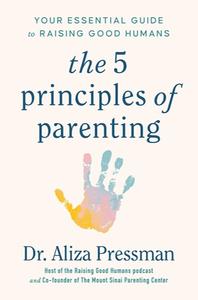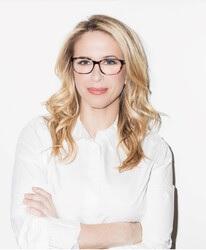The 5 Principles of Parenting: Your Essential Guide to Raising Good Humans by Aliza Pressman ($28.99, 9781668014530, January 23, 2024).
 My love affair with developmental psychology started before I became a mom.
My love affair with developmental psychology started before I became a mom.
What makes us become who we are, from our earliest moments and over time? How can parents and communities best shelter the newcomers? What can go wrong? How can we heal from mistakes? I found it fascinating that there was a whole field of study exploring the answers to these questions.
Twentieth-century Swiss philosopher and psychologist Jean Piaget spent much of his professional career watching and listening to children to discover the secrets of the mind. In a thought-leap considered radical at the time, he observed that children aren't just empty vessels waiting to be filled with knowledge, but also active builders of their own education— little scientists constantly creating and testing their theories of their worlds. This made so much sense to me. As parents, we do that, too! We're not just empty vessels in need of being filled up with expert know- how. We bring all our own histories and experiences to parenting. We're parent-scientists, constantly testing strategies to see if they make our lives in our unique families' experiences easier. Through Relationships, self- and co-Regulation, Reflection, Rules, and Repairs, we become active builders of our own family dynamics.
Each of our ideas of what makes for a good human is unique. There are literally millions of ways to be a good human. As such, there are millions of ways to be a good parent. Parenting asks us to interrogate and reflect on what we think "good" means.
Developmental psychology can help.
As a developmental psychologist engaged in the science of how we get to be who we are and how we change over time, I always draw from the research. But research is dynamic; all scientific studies are con- ducted in some context, and that context isn't your unique family. Your personal experience is valuable. Your cultural and family traditions are meaningful. Some of your quirks are probably strengths unique to your situation.
Some parents read absolutely everything, and some reject "expert" advice across the board. But I've learned with all things in parenting: there's a space between—and for me, that's what this book is about. When we focus on our Relationships within our families, when we take time for Regulation and Reflection, when we're clear about Rules, and when we make a habit of Repair after mistakes, we find that space be- tween micromanagement and chaos.
Extreme ideas may seem comforting at times, like there's some way to "win" at parenting if only you and your child conduct yourselves just right. Like, Oh good, there's a clear answer. All my worries about raising a good human can be put to rest. I get that. The illusion of total certainty has incredible appeal. But as you may have already learned the hard way, extremes are unsustainable. The middle road might not seem as sexy or as black-and-white, but trust me—it's an easier road to stay on.
So much of parenting can feel like a one-and-done challenge— if we don't get attachment right with our newborns, we and they are doomed to lifetimes of feeling alienated. Not true! Research on attachment shows that attachment relationships are dynamic. And like all relationships, attachment relationships can be mended, shifted, and built upon. It's called repair, and it's one of my five principles of parenting. Not only can mistakes be met with repairs and do-overs, but these mistakes and repairs can actually strengthen our relation- ships. As you read this book, I want you to let your ears perk up when- ever we come to one of these Five Rs: Relationships, Regulation, Reflection, Rules, and Repair. The Five Rs lead to that elusive sixth R we're all hoping and building toward: Resilience.
Science can seem heady at times, but it's earthy, too. It's steady—like an old tree. Developmental psychology feels that way to me, too. It honestly boggles my mind that we don't learn about developmental psychology as a part of high school. It's completely illuminating!
Some of the old "expert" philosophies and practices have been debunked, of course. I'm not sure how the advice to start potty training babies at birth ended up in a 1932 US government pamphlet for new moms, but we clearly now know that's ridiculous. In a 1962 book, Dr. Walter Sackett recommended giving babies black coffee starting at six months old! Obviously, I don't recommend that one, either.
More recently, in the 1980s and 1990s, Dr. William Sears, a pediatrician, and coauthor Martha Sears, a registered nurse, took one of the most important words in developmental science—attachment—and applied it to their parenting approach, and they named it "attachment parenting." This confused millions of readers, suggesting that a few particular parenting practices were a method to obtain secure attachment. This isn't even remotely true, and potentially made a lot of mothers feel like failures. Attachment parenting, which is the Searses' philosophy, has nothing to do with the formation of a secure attachment relationship, a well-researched concept that is predictive of future physical, mental, and developmental health (and a buffer for the impact of toxic stress).
These days I get media requests whenever a new study or parenting influencer comes out saying this or that, whether about pacifiers, or screen time, or behavior modification. Often, I can't tell the journalists what they want to hear. I won't say that an extra hour in front of the television will ruin a kid's life, any more than I'd say giving them a cup of coffee is a good idea. Extremes make for clickable headlines. Extremes promise safety because they feel so certain. But it's a false sense of safety. The science is clear: humans don't thrive at extremes.
All this is to say that we have to be willing to reject expert advice. We have to take every study in the context in which it was done and not blindly generalize it to every family out there. But as I continued to study developmental psychology, I found it fascinating that, despite the fact we often say the new science disputes the old or we've discovered some revolutionary new insight, much of what the twentieth-century OG psychologists theorized has been held up with scientific evidence. More recently, neuroscience has affirmed much of the older wisdom from the developmental sciences on resilience. Neuroscience has also found that mindfulness, visualization, and meditation—practices once considered unscientific—should be in all our developmental and parenting tool kits. When we breathe in, we inhale the air the trees have exhaled. When we breathe out, we exhale the carbon dioxide for the trees to send to their young. The most fundamental parenting practice is something we've been doing in tandem with the trees since our ancestors came down from their branches and started walking around with two feet on the ground.
So, breathe. Doing the best we can more often than not might not seem like a super-high bar for parenting, but I'm delighted to report what the scientific research has clearly shown: if we've got the essential information and we apply it more often than we don't, that's good enough.
---
 |
|
| (Photograph by Alex Phillips) | |
Dr. Aliza Pressman is a developmental psychologist with nearly two decades of experience working with families and the health care providers who care for them. Aliza is an assistant clinical professor in the Division of Behavioral Health Department of Pediatrics at the Icahn School of Medicine at Mount Sinai Hospital where she is cofounding director of The Mount Sinai Parenting Center. Aliza is also the host of the hit podcast, Raising Good Humans. She holds a BA from Dartmouth College, an MA in Risk, Resilience, and Prevention from the Department of Human Development at Teachers College and her PhD in developmental psychology from Columbia University Graduate School of Arts and Sciences. Aliza also holds a teaching certificate in mindfulness and meditation from The Greater Good Science Center at the University of California at Berkeley. Aliza is the mother of two teenagers.

